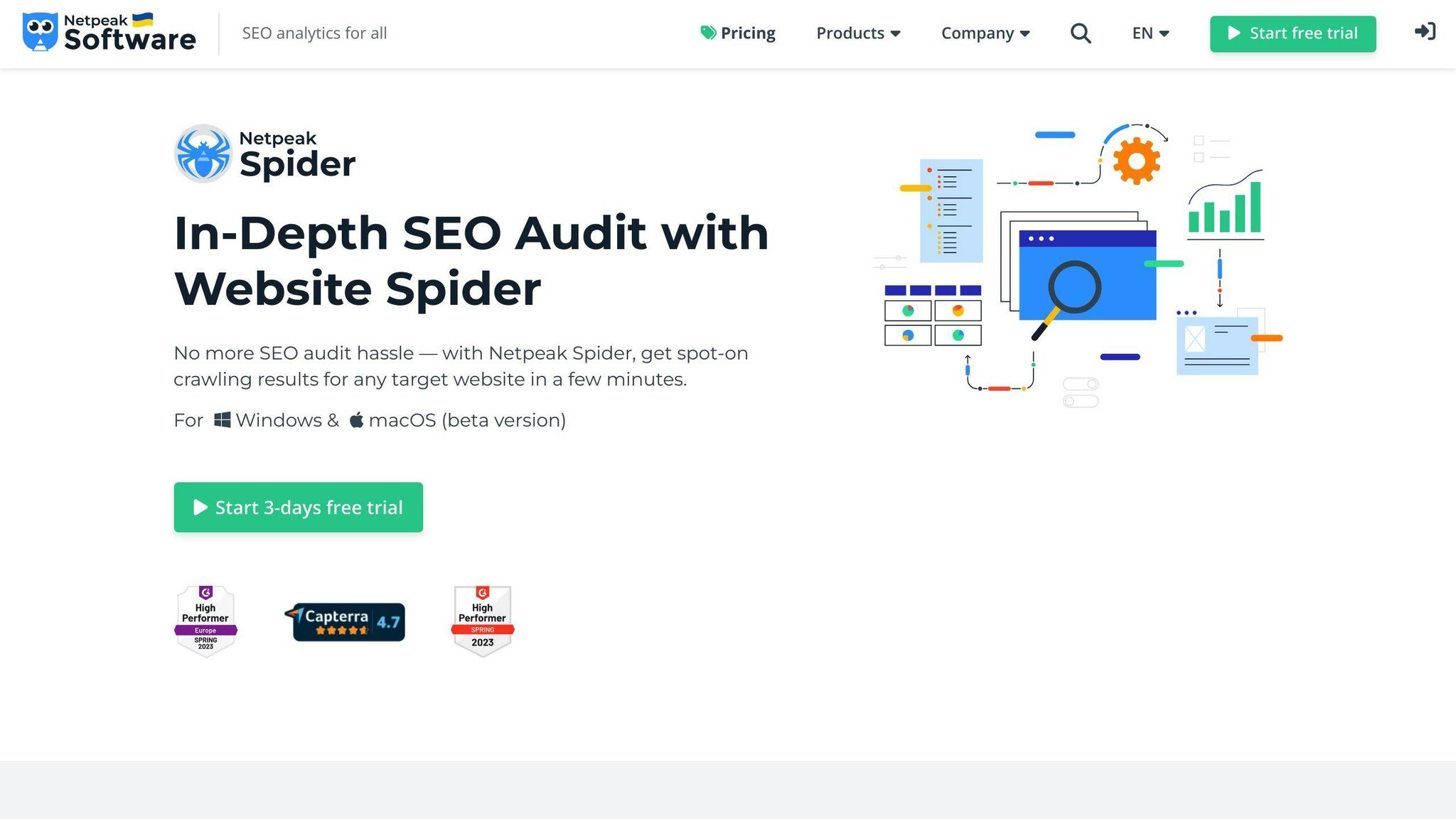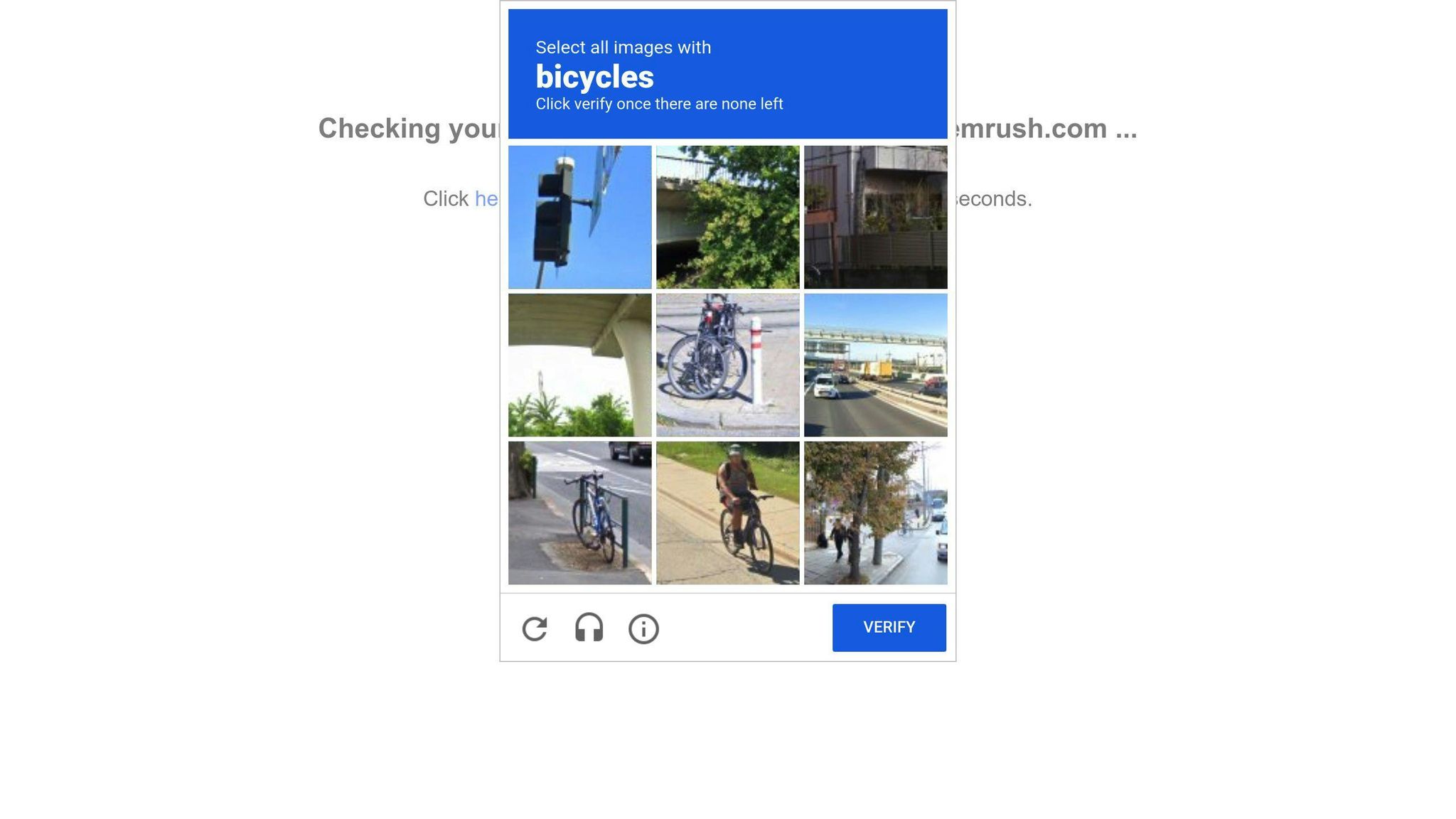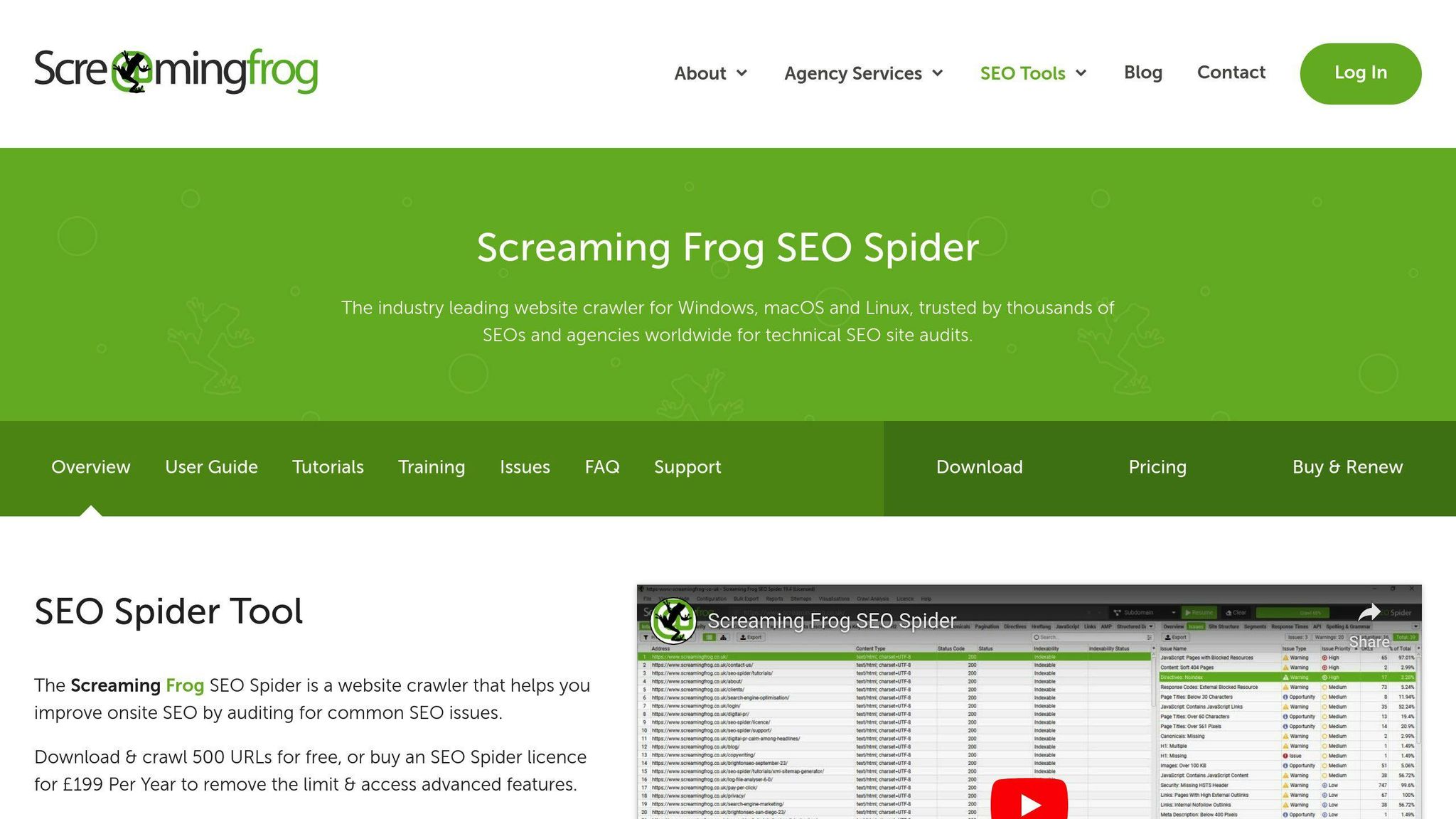In 2024, automated SEO audits have become crucial for businesses to maintain visibility and a competitive edge online. These tools analyze websites quickly and thoroughly, identifying technical issues, content gaps, and areas for optimization - saving time and resources compared to manual audits.
Key Benefits of Automated SEO Audits:
| Benefit | Description |
|---|---|
| Time-saving | Much faster than manual processes |
| Comprehensive Analysis | Scan all aspects of a website |
| Real-time Insights | Provide up-to-date data and recommendations |
| Scalability | Audit large websites or multiple sites efficiently |
| Consistency | Follow standardized processes for reliable results |
Automated SEO audits help businesses:
- Identify and address technical SEO problems like broken links, slow page load times, and indexing issues
- Optimize on-page elements such as keyword targeting, titles, meta descriptions, and content quality
- Analyze off-page factors like backlink profiles, social media presence, and online reputation
Related video from YouTube
Why Automated SEO Audits Matter
In today's fast-moving digital world, where search engines frequently update their algorithms and users expect smooth online experiences, manual SEO audits can no longer keep up. Automated SEO audits have become a vital solution, helping businesses stay ahead of the curve and maintain a competitive edge.
Delivering Quick Results
One of the key advantages of automated SEO audits is their speed. While manual audits can take weeks or even months, automated tools can scan and analyze websites in just hours or days. This rapid turnaround is crucial for businesses in highly competitive industries, where any delay in identifying and addressing SEO issues can lead to lost opportunities and reduced online visibility.
Thorough and Accurate Analysis
Automated SEO audits use advanced algorithms and machine learning to meticulously analyze every aspect of a website, from technical SEO factors like site architecture and crawlability to on-page elements like content optimization and user experience. By identifying even the most subtle issues that could be overlooked in manual audits, businesses can proactively address potential roadblocks and optimize their online presence.
Data-Driven Decision Making
In the world of SEO, data is king. Automated SEO audits generate comprehensive reports packed with actionable insights and data-driven recommendations. These insights enable digital marketers to make informed decisions, prioritize their efforts, and allocate resources effectively. By leveraging real-time data and analytics, businesses can continuously monitor their website's performance, track the impact of their optimization efforts, and adjust their strategies accordingly.
Scalability and Consistency
As businesses expand their online presence, the need for scalable and consistent SEO audits becomes crucial. Automated tools can effortlessly handle audits for large websites or multiple websites simultaneously, ensuring a consistent and standardized approach across all digital properties. This scalability not only saves time and resources but also ensures that no website falls through the cracks, enabling businesses to maintain a cohesive and optimized online presence.
In the ever-evolving digital landscape, where speed, accuracy, and data-driven decision-making are essential for success, automated SEO audits have become an indispensable tool for businesses seeking to stay ahead of the competition. By utilizing automation, organizations can streamline their SEO efforts, enhance their online visibility, and deliver user experiences that resonate with their target audience.
Key Benefits of Automated SEO Audits
| Benefit | Description |
|---|---|
| Time-Saving | Automated audits are much faster than manual processes, freeing up resources. |
| Thorough Analysis | Advanced tools can scan all aspects of a website, leaving no stone unturned. |
| Real-Time Insights | Audits can be run regularly, providing up-to-date data and recommendations. |
| Scalability | Automation allows auditing large websites or multiple sites efficiently. |
| Consistency | Automated tools follow standardized processes, ensuring reliable results. |
Inside an Automated SEO Audit
An automated SEO audit is a thorough examination of a website's search engine optimization (SEO) health, carried out by specialized software tools. These audits carefully inspect various aspects of a website to identify areas for improvement and ensure optimal visibility and performance in search engine results.
Technical SEO Audit: Checking Site Health
Technical SEO refers to the behind-the-scenes elements that influence a website's ability to be crawled, indexed, and rendered by search engines. An automated technical SEO audit evaluates factors such as:
- Site Architecture: How a website is structured, including its URL structure, internal linking, and navigation, can significantly impact its crawlability and indexability. Automated tools analyze the site's architecture to identify potential issues and suggest improvements.
- Crawlability and Indexability: Search engines rely on their ability to crawl and index a website's pages to understand their content and relevance. Automated audits check for issues that may prevent search engine bots from accessing or indexing certain pages, such as robots.txt files, noindex tags, or JavaScript-rendered content.
- Site Speed and Performance: Page load times and overall website performance are crucial for user experience and search engine rankings. Automated tools measure various performance metrics, including page speed, server response times, and resource optimization, providing actionable insights for improvement.
- Mobile-Friendliness: With the majority of internet traffic coming from mobile devices, ensuring a website is optimized for mobile users is essential. Automated audits evaluate factors like responsive design, mobile usability, and mobile-specific technical issues.
On-Page SEO Audit: Content and Keywords
On-page SEO refers to the optimization of individual web pages to improve their relevance and appeal to both search engines and users. An automated on-page SEO audit analyzes elements such as:
- Content Quality and Relevance: High-quality, relevant content is essential for both user engagement and search engine rankings. Automated tools can evaluate content for factors like keyword usage, readability, and uniqueness, providing insights for optimization.
- Meta Tags: Meta titles and descriptions play a crucial role in how a website's pages are displayed in search engine results. Automated audits ensure that these tags are optimized for target keywords and accurately represent the page's content.
- Heading Structure and Formatting: Proper use of heading tags (H1, H2, etc.) and formatting elements like bold and italics can improve content organization and readability for both users and search engines. Automated tools analyze these elements and provide recommendations for optimization.
- Internal Linking: A well-structured internal linking strategy helps search engines understand the relationship between pages and distributes link equity throughout the website. Automated audits identify opportunities for improving internal linking and anchor text optimization.
Off-Page SEO Audit: Online Presence
Off-page SEO refers to the factors that influence a website's authority and reputation from outside its own domain. An automated off-page SEO audit typically focuses on:
- Backlink Analysis: The quality and quantity of backlinks (links from other websites) pointing to a site are crucial ranking factors. Automated tools analyze a website's backlink profile, identifying potential issues like low-quality links, and providing insights for link building and disavow strategies.
- Social Media Presence: A strong social media presence can contribute to a website's online visibility and authority. Automated audits assess a website's social media footprint, including the number of followers, engagement rates, and the quality of social signals.
- Online Reputation and Brand Mentions: A website's online reputation and brand mentions across the web can impact its search engine rankings. Automated tools monitor and analyze brand mentions, reviews, and other online signals to identify potential reputation management opportunities.
Top Automated SEO Audit Tools in 2024
In 2024, businesses have access to many powerful automated SEO audit tools to streamline their optimization efforts and gain an edge over competitors. Here are some of the leading tools and their key features:
1. Netpeak Spider

Netpeak Spider is a comprehensive website crawler and SEO audit tool with advanced features:
- Website Crawling and Indexing: Crawls websites to identify technical issues, broken links, duplicate content, and more.
- On-Page Optimization Analysis: Analyzes titles, meta descriptions, headings, and content optimization.
- Backlink Analysis: Provides insights into a website's backlink profile, including link quality and potential link-building opportunities.
- Competitor Comparison: Allows users to compare their website's performance with competitors, including keyword rankings and backlink profiles.
- Reporting and Data Visualization: Generates detailed reports and visualizations to help users understand and prioritize optimization efforts.
2. Semrush

Semrush is a popular all-in-one SEO platform offering a suite of tools for auditing and optimizing websites:
| Feature | Description |
|---|---|
| Site Audit | Performs a comprehensive technical and on-page SEO audit, identifying issues and providing recommendations. |
| Backlink Audit | Analyzes a website's backlink profile, identifying toxic links and opportunities for link building. |
| Keyword Research | Provides insights into keyword trends, search volumes, and competition levels. |
| Rank Tracking | Monitors a website's keyword rankings and tracks progress over time. |
| Competitor Analysis | Allows users to analyze competitors' strategies, including keyword rankings, backlink profiles, and content strategies. |
3. Screaming Frog

Screaming Frog is a powerful website crawler widely used for technical SEO audits:
- Website Crawling and Indexing: Crawls websites to identify technical issues, broken links, duplicate content, and more.
- On-Page Optimization Analysis: Analyzes titles, meta descriptions, headings, and content optimization.
- Visualization and Reporting: Generates visual representations of a website's structure and provides detailed reports on SEO issues.
- Integration: Integrates with other popular SEO tools and platforms for a comprehensive optimization workflow.
These are just a few examples of the many automated SEO audit tools available in 2024. When choosing a tool, businesses should consider their specific needs, budget, and the level of customization and integration required.
sbb-itb-b8bc310
Choosing the Right SEO Audit Tool
Selecting the proper SEO audit tool is crucial for your business. Here are some key factors to consider:
Ability to Grow
Evaluate if the tool can handle large websites with many pages as your online presence expands. The tool should scale smoothly. Also, look for flexibility in customizing the audit process and integrating with other tools you use.
Accurate and Thorough Analysis
The accuracy of the audit results is vital. Look for tools that provide in-depth analysis, covering technical SEO, on-page optimization, backlink analysis, and more. Ensure the tool can effectively identify and prioritize issues impacting your search engine visibility.
User-Friendly Interface and Reporting
A user-friendly interface and clear reporting capabilities can enhance the audit experience. Look for tools with visually appealing reports, making it easier to understand and communicate findings. Consider tools that allow customizable reporting and data export options.
Integration and Compatibility
Seamless integration with other platforms like Google Analytics, Google Search Console, and content management systems can streamline your workflow. Ensure the audit tool integrates well with your existing tech stack.
Support and Resources
Evaluate the level of support and resources provided by the vendor. Look for documentation, tutorials, and knowledgebases to help you get the most out of the tool. Consider the availability of customer support and the vendor's reputation for addressing user queries.
Cost and Value
While cost should not be the sole factor, consider the pricing model and the value the tool offers relative to its cost. Look for tools that provide a good balance between features, scalability, and affordability, aligning with your budget and business needs.
How to Conduct an Automated SEO Audit
Performing an automated SEO audit involves a systematic approach to identify and address issues impacting your website's visibility in search engines. Here are the key steps to follow:
1. Prepare for the Audit
- Define the scope and goals of your audit (e.g., technical SEO, on-page optimization, backlink analysis).
- Gather essential data, such as website analytics, keyword rankings, and existing SEO reports.
- Ensure your website is properly configured for crawling and indexing by search engines.
2. Choose the Right Audit Tool
Select an automated SEO audit tool that meets your needs, website size, and budget. Consider factors like analysis depth, accuracy, scalability, user-friendliness, and integration capabilities.
3. Run the Audit
- Configure the tool according to your website and audit scope.
- Initiate a comprehensive crawl and analysis of your website.
- Monitor the audit progress and ensure it completes successfully.
4. Review the Audit Report
- Thoroughly examine the audit report, paying close attention to critical issues and prioritized recommendations.
- Categorize the findings based on their impact and complexity, creating an action plan.
- Identify quick fixes and low-hanging fruit that can be addressed immediately.
5. Implement Recommendations
- Collaborate with your development team to address technical SEO issues, such as site architecture, crawlability, and indexability.
- Optimize on-page elements, including titles, meta descriptions, headings, and content quality.
- Improve off-page factors, like building high-quality backlinks and managing online brand mentions.
6. Monitor and Iterate
- Continuously monitor your website's SEO performance using analytics and ranking data.
- Conduct regular automated audits to identify new issues and opportunities.
- Refine your SEO strategy based on the insights gained from the audits.
7. Leverage Expert Guidance
While automated tools are powerful, they should complement human expertise. Involve SEO professionals to interpret complex findings, provide strategic guidance, and ensure your efforts align with industry best practices and search engine guidelines.
The Importance of Human Expertise
While automated SEO audits provide valuable data and streamline the optimization process, relying solely on these tools has limitations. Human expertise plays a vital role in guiding the audit process, interpreting findings, and making strategic decisions.
Automated tools often lack the contextual understanding and industry knowledge that experienced SEO professionals possess. They may overlook critical nuances, miss opportunities, or provide generic recommendations that fail to align with your business goals and target audience.
Interpreting Complex Findings
SEO audits can uncover complex technical issues, content gaps, or backlink profile anomalies that require in-depth analysis and expert judgment. An experienced SEO professional can delve into the root causes, evaluate the impact on search performance, and recommend tailored solutions.
Prioritizing Recommendations
Automated audits often present a long list of recommendations without prioritizing their importance or potential impact. An SEO expert can assess the findings, weigh the costs and benefits, and create a strategic roadmap that focuses on high-impact tasks first, ensuring efficient resource allocation.
Aligning with Business Goals
Successful SEO strategies align with the overarching business objectives, target audience, and industry landscape. While automated tools provide data-driven insights, human expertise is necessary to translate these findings into actionable plans that support your unique business goals and resonate with your target customers.
Staying Compliant with Guidelines
Search engine algorithms and guidelines are constantly evolving, and automated tools may not always keep pace with these changes. SEO professionals stay up-to-date with the latest industry developments, ensuring your optimization efforts remain compliant and avoid potential penalties or negative impacts.
Providing Strategic Guidance
Beyond addressing technical issues, human expertise is invaluable in developing a comprehensive SEO strategy that encompasses content creation, user experience optimization, link building, and ongoing performance monitoring. SEO professionals can provide strategic guidance, leveraging their experience and industry best practices to drive sustainable growth and long-term success.
While automated SEO audits are powerful tools, they should complement, not replace, human expertise. By combining the efficiency of automation with the insights and guidance of SEO professionals, you can unlock the full potential of your website's search engine visibility and performance.
The Future of Automated SEO Audits
As we move into 2024, automated SEO audits will transform digital marketing, offering efficiency, insights, and more effective optimization. These advanced tools will continue evolving, harnessing AI and machine learning.
Increased Efficiency and Scalability
Automated audits will streamline optimization, enabling businesses to analyze and optimize websites at scale. With the ability to crawl and audit vast numbers of pages quickly, companies can stay ahead and maintain a competitive edge.
Predictive Analytics and Strategic Insights
Using AI and machine learning, automated audits will provide predictive analytics and strategic insights. These tools will not only identify existing issues but also anticipate potential roadblocks, enabling proactive optimization strategies aligned with evolving search engine algorithms and user behavior.
Integration with Other Marketing Platforms
As automation becomes more prevalent, SEO audit tools will integrate with other marketing platforms, enabling a holistic approach to digital marketing. This integration will facilitate data-driven decision-making, allowing businesses to optimize their online presence across multiple channels.
Personalized Recommendations and Adaptive Learning
AI-driven SEO audit tools will provide personalized recommendations tailored to individual business needs. By continuously learning and adapting to new data, these tools will offer customized optimization strategies considering industry nuances, target audience preferences, and unique business objectives.
Increased Accessibility and Cost-Effectiveness
As the technology behind automated SEO audits advances and becomes more widespread, these tools will become increasingly accessible and cost-effective for businesses of all sizes. This democratization of SEO optimization will level the playing field, empowering smaller organizations to compete effectively in the digital realm.
While the future of automated SEO audits is promising, it is essential to balance automation and human expertise. Experienced SEO professionals will continue to play a crucial role in interpreting complex findings, aligning strategies with business goals, and providing strategic guidance. By combining the power of automation with human insights, businesses can unlock the full potential of their online presence and drive sustainable growth in the digital age.